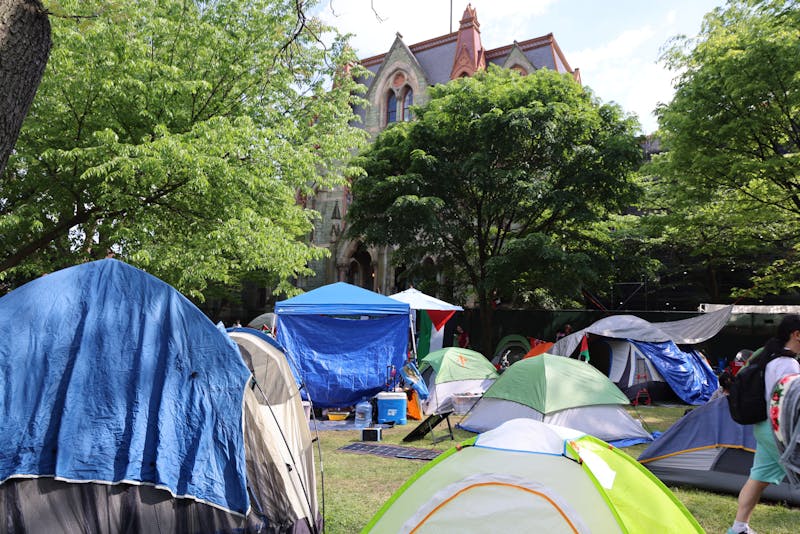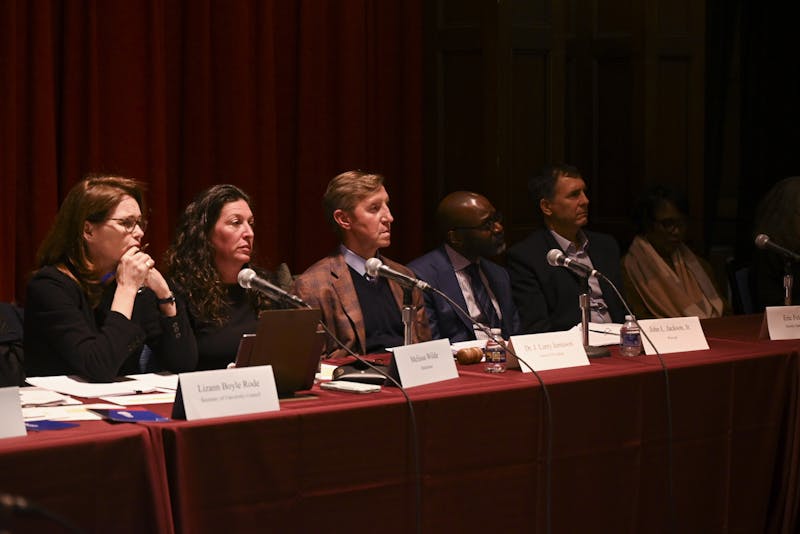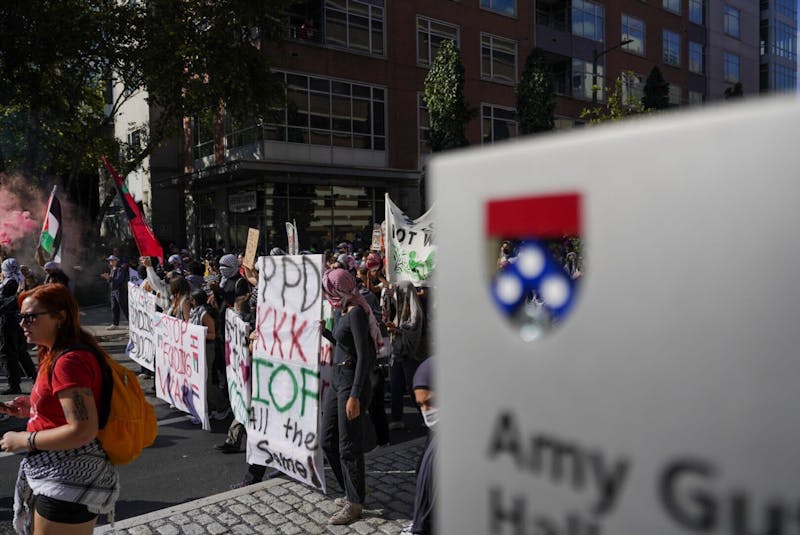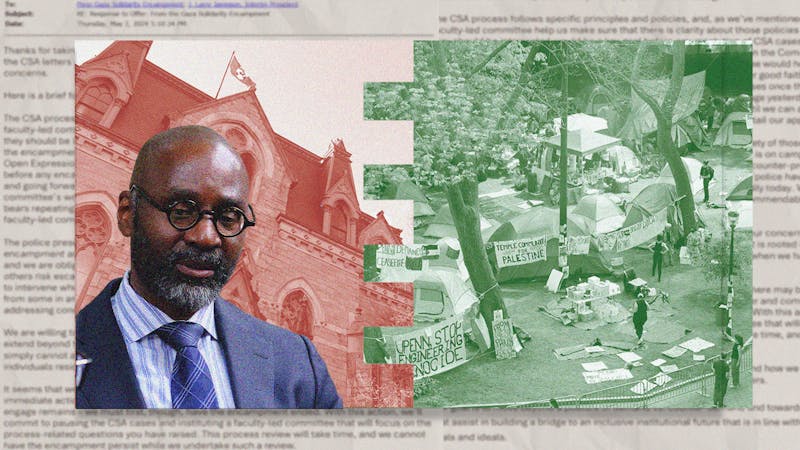
Penn entered 2024 in a state of turmoil following widespread protests surrounding the Palestine Writes Literature Festival and controversy surrounding the campus' response to the Oct. 7, 2023 Hamas attacks on Israel.
The year included significant pro-Palestinian and pro-Israeli activism, and the Gaza Solidarity Encampment at the end of the spring semester sparked Penn's controversial implementation of temporary open expression guidelines.
Jan. 18 — A group of Penn faculty members formed Penn Faculty for Justice in Palestine, standing in solidarity with Palestinians and advocating for "shared governance" of the University.
Jan. 29 — PFJP organized a die-in protest outside College Hall, aiming to draw attention toward ongoing violence in Gaza and the University’s inaction “towards the Palestinian community and the racist, hate speech directed towards faculty, staff, and students calling for Palestinian justice.”
Feb. 18 — The Freedom School for Palestine, a pro-Palestinian advocacy group at Penn, hosted the first of several study-ins in Van Pelt-Dietrich Library, aiming to raise awareness of the Israel-Hamas war’s impact on education in Gaza. Five Penn students received notices of disciplinary action for the demonstration.
Feb. 22 — Penn community members hosted a vigil near the LOVE Sign in memory of Israeli victims of the Oct. 7, 2023 Hamas attacks.
March 1 — Pro-Palestinian protesters affiliated with the Freedom School interrupted Interim Penn President Larry Jameson’s first University Board of Trustees meeting in a call for “endowment transparency now.”
March 9 — A group of Penn professors filed a lawsuit against the University, alleging a pattern of “McCarthyism” and seeking to stop Penn from complying with an ongoing request from the United States House Education and the Workforce Committee for documents.
March 21 — The Daily Pennsylvanian reported that Penn was investigating Penn Students Against the Occupation of Palestine, a pro-Palestinian student organization.
March 28 — A letter sent to Interim Penn President Larry Jameson with nearly 150 signatories recommended punishment for eight Penn professors. In the letter, the group alleged the professors were involved in antisemitic behavior, writing they were “in derelict of their scholarly responsibilities.”
April 4 — Philadelphia community members gathered at Penn to protest the University’s connection with Ghost Robotics, a company founded by Penn alumni and housed in Pennovation Works that they allege has produced robot dogs used by the Israeli military in the ongoing war in Gaza.
April 19 — Nearly a month after the DP reported that Penn was investigating PAO, it revoked the organization’s status as a registered student group in a step that reflected increased tensions between the University and pro-Palestinian activists on campus. The DP later reported that PAO was deregistered due to three violations of requirements for student organizations at Penn, particularly for not providing information on its membership.
April 25 — The Penn Muslim Students’ Association and Penn Israel Public Affairs Committee proposed dueling referendums of the undergraduate student bodies on questions relating to the University’s response to the Israel-Hamas war and divestment from Israel.
April 25-May 10 — Pro-Palestinian activists joined a nationwide movement in establishing a 16-day Gaza Solidarity Encampment on College Green. Over the course of the encampment, protesters met with members of Penn’s administration several times to negotiate, but negotiations eventually came to a standstill.
April 30 — The University began disciplinary proceedings on several student organizers involved in the Gaza Solidarity Encampment. Penn further sought disciplinary measures against nine encampment members on May 7, according to an encampment spokesperson, and six students were placed on mandatory leaves of absence on May 9.
May 2 — Penn asked the Philadelphia Police Department for immediate help with managing the encampment amid heightened tensions between pro-Palestinian protesters and pro-Israeli counter-protesters — and the PPD declined the request.
May 8 — Amid negotiation breakdowns with Penn administration, the encampment expanded onto the east side of College Green.
May 9 — Shapiro said it was “past time” for Penn to disband the encampment during an unrelated press conference in Pittsburgh.
May 10 — At around 6 a.m., Penn Police in riot gear — with the assistance of Philadelphia Police — swept the encampment and arrested 33 people, including nine students. Jameson announced the indefinite closure of College Green.
The sweep was swiftly condemned by faculty members and local politicians, but praised by Shapiro and Sen. Bob Casey (D-Pa.). Faculty Senate Chair Tulia Falletti resigned her position in response to the sweep.
Later that evening, a group of protesters marched through University City in a critique of the sweep and Jameson’s actions. Several demonstrators breached the gates of Jameson’s on-campus residence.
May 14 — Penn banned 24 non-University affiliated individuals involved in the encampment from campus.
May 17 — Pro-Palestinian protesters attempted to occupy Fisher-Bennett Hall — an effort met swiftly by Penn and Philadelphia Police officers, who arrested 19 people, including seven Penn students.
May 19-20 — Several pro-Palestinian students who were previously placed on mandatory leave were barred from entering the College of Arts and Sciences graduation ceremony. The Class of 2024 Commencement ceremony the next day proceeded without incident following the University’s implementation of more stringent security measures.
May 28 — Penn’s Committee for Open Expression called for a review of the Guidelines for Open Expression, citing a need for “strengthening consistent with the law.”
June 6 — The University released new temporary guidelines for protests and open expression, directly banning or addressing several aspects of the encampment or other protests from the 2023-24 academic year. A DP analysis of the guidelines revealed contradictions and ambiguities throughout the new policy.
June 27 — 63.6% of Penn students voted in favor of the MSA's referendum asking undergraduate students whether the University should divest from Israel. Jameson rebuffed the results of the referendum, which 22% of undergraduate students participated in.
July 2 — Penn issued semesterlong or yearlong suspensions for four students involved in on-campus pro-Palestinian activism, including during the Gaza Solidarity Encampment, according to an Instagram post from the Freedom School for Palestine.
Aug. 29 — The DP acquired troves of internal discussions between Penn and Mayor Cherelle Parker's office, revealing that the City resisted pressure from Penn for more assistance in managing the campus and urged the University to pursue a peaceful resolution to the encampment while disputing Penn's characterization of violence on College Green.
Sept. 10 — Penn announced it would limit statements on local and world events that do not directly impact the University in a move toward institutional neutrality. Community members expressed support for the policy but questioned Penn's ability to effectively implement it.
Sept. 12 — Pro-Palestinian activists claimed responsibility for an incident of vandalism at the Ben Franklin statue in front of College Hall in which red paint was splattered on the statue.
Sept. 27 — The University sought to relocate a vigil mourning “martyrs, from Palestine to Lebanon to Syria” from the center of campus, citing the temporary guidelines for open expression. A Penn security officer said participants were trespassing.
Sept. 30 — Documents obtained by the DP, and interviews with Penn's faculty, cast light on the negotiations between members of the encampment and Penn administration — and revealed how the University made concessions to protesters while drafting plans to arrest them.
Oct. 7 — Several Penn organizations commemorated the one-year anniversary of the Hamas attacks on Israel through events including a memorial service and a community dinner, drawing attendance from hundreds of Jewish Penn community members.
Penn MSA and the Penn Arab Student Society hosted a memorial for lives lost in Palestine, Lebanon, Yemen, and Syria.
Additionally, hundreds of protesters from across Philadelphia attended a rally and march organized by the Philadelphia chapter of Students for Justice in Palestine, which ended at Pennovation Works and led to the arrests of four people. In a statement issued on Oct. 12, Philadelphia SJP called the Hamas attacks “a necessary step towards the liberation of a colonized people.”
Oct. 10 — MSA and PASS organized a vigil at the LOVE statue to commemorate those killed in Israel’s attacks on Gaza and Lebanon.
Oct. 13 — The Joseph H. Lauder Institute for Management and International Studies issued a statement of neutrality.
Oct. 14 — More than 250 individuals attended an Indigenous Peoples’ Day vigil mourning Palestinian, Lebanese, and Syrian lives in conflicts in the Middle East, and Penn community members criticized the large police response to the vigil as “overblown” and “disruptive.”
Oct. 18 — Penn and Philadelphia Police officers executed a search warrant on an off-campus house belonging to pro-Palestinian Penn student activists, prompting concern from faculty members and politicians. The University later said Jameson was “not involved” in the raid.
Oct. 19-23 — Several instances of vandalism on locations in and around Penn’s campus commemorated assassinated Hamas leader Yahya Sinwar — for which a group called “Sinwar’s Stick” claimed responsibility — while others used more derogatory and threatening language.
Oct. 22 — Penn’s chapter of Jewish Voices for Peace hosted a Gaza Solidarity Sukkot in the backyard of the Penn Women’s Center, commemorating lives lost in Gaza.
Oct. 24 — MSA demanded divestment from Israel at a University Council meeting, although the group’s divestment proposal was declined by the University Council Steering Committee.
Oct. 30 — The Executive Committee of Penn’s chapter of the American Association of University Professors criticized the University’s temporary open expression guidelines.
Nov. 4 — Around 30 Penn students and faculty hosted a teach-out at Clark Park in protest of the search warrant executed at an off-campus house belonging to pro-Palestinian student activists.
Nov. 10 — A rally at Penn Hillel called for more media attention toward antisemitic attacks in the United States, Israeli hostages in Gaza, and victims of recent attacks on Israeli soccer fans in the Netherlands.
Nov. 21 — A DP investigation of documents and emails between the Penn administration and Governor Josh Shapiro’s office revealed that Shapiro was more involved in Penn's response to campus antisemitism and the Gaza Solidarity Encampment than previously known.
Dec. 4 — At a University Council open forum, several Penn community members addressed concerns about open expression on campus and Penn Police's execution of the off-campus search warrant.
The Daily Pennsylvanian is an independent, student-run newspaper. Please consider making a donation to support the coverage that shapes the University. Your generosity ensures a future of strong journalism at Penn.
Donate










